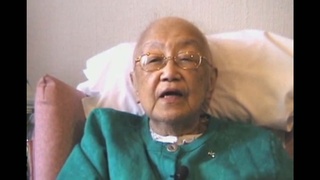Interviews
Grandmother's influence on decision to go to Japan
I think it’s my grandmother that made me come to Japan. As I said, my family couldn’t give me a ticket to travel, so I had to find some way to do that. At university, the foreign exchange program—the study abroad program—was one of the ways I thought I could do that. I’ve always thought I would go to Europe. In high school, I studied German. And as a child, America’s basically a European culture. Now we get a big influx of Latinos and Asians, but back then, it was still basically a European culture. Then, because of the War, too, it was difficult for the Japanese Americans to form their own identity. Being born in America, you think, well you want to be part of the melting pot of America, being an American. So, I thought, when I got the form for the exchange program, since I had studied German, I thought I would go to Heidelberg and put that down as my choice. But when it came to filling that one section, I put Japan for the first time. I said, I think it’s because of my strong grandmother—watching her and my parents as I’m growing up.
Date: November 28, 2003
Location: Saga, Japan
Interviewer: Art Nomura
Contributed by: Art Nomura, Finding Home.
Explore More Videos


Not wanting to stand out as a foreigner
Sansei Japanese American living in Japan and Kendo practioner

Have compassion for all of humanity
(b. 1923) Nisei from Washington. Resisted draft during WWII.

Identity crisis (Spanish)
(b. 1969) Former president of Centro Nikkei Argentino.

Why her parents came to Canada
(1918-2004) Interned in Slocan during World War II. Active member of the Japanese Canadian community.

Never sang Enka outside the family
(b. 1981) Enka Singer

Both Japanese and American identities though Japanese dance
(1918-2023) Nisei Japanese kabuki dancer


Family background of Fredrick Yoshihide Sasaki
(b. 1918) Issei businessman in Canada

Four sisters had international marriages (Japanese)
(b. 1937) A war bride from Yokohama


The reason to stay in Japan after his third year
Japanese American Creative designer living in Japan

Results of being more American than Japanese
(1924-2018) Researcher, Activist

Trying to convey the meaning of the songs
(b. 1981) Enka Singer

Choice to move east or go to Japan
(b.1920) Japanese Canadian Nisei. Established the Ikenobo Ikebana Society of Toronto
